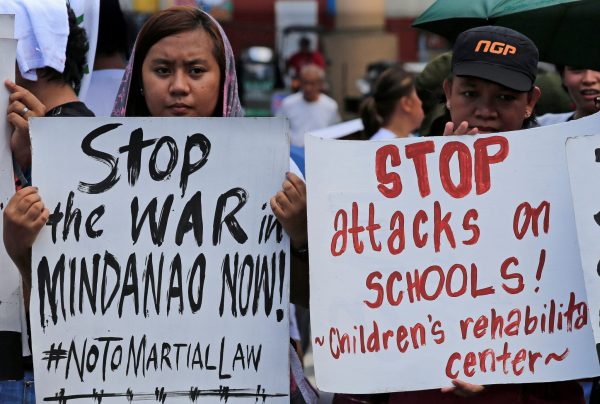But the success of the Maute Group in effectively holding a bustling city like Marawi hostage shows that martial law may not be the appropriate state response to terrorism. In short, this is because martial law does not confer any new legal powers to the president.
This fact was affirmed by Solicitor General Jose Calida during oral arguments before the Supreme Court, which on 6 July upheld the constitutionality of Proclamation 216 after several petitions were filed against the martial law declaration. Indeed, the government itself admits that, at best, martial law has only functioned as a strong scare tactic against the terrorists in the region.
Lacking any real change in law enforcement powers, it is hard to imagine what has changed for Filipino security forces in their efforts to eliminate terrorism. Ironically, lost in the constitutional debate over martial law is the fact that there is already an existing anti-terrorism framework.
The lead government agency to address the problem of terrorism is the Anti-Terrorism Council (ATC). Created pursuant to the Human Security Act (HSA) of 2007, the ATC is an inter-agency body tasked with implementing the HSA and the Philippines’ anti-terrorism policy. Its mandate includes formulating and adopting ‘comprehensive, adequate, efficient and effective anti-terrorism plans, programs, and counter-measures to suppress and eradicate terrorism and to protect all people from act of terrorism’.
Naturally, there should first and foremost be an audit of the ATC’s actions from its creation a decade ago to the Marawi City siege by the Maute Group in May. Questions on how intelligence regarding the movements of terror groups was analysed and then shared with ground personnel need to be answered. Given the government’s difficulties in dealing with the Marawi siege, there must now be a thorough review of the overall anti-terrorism framework, no matter how hard and acrimonious this process might be.
Needless to say, the Duterte administration must not waver in addressing the socio-economic roots of terrorism. But if the Philippine government is to formulate a more comprehensive and coherent anti-terrorism response, then the peculiarities of terrorism in the country must be given due consideration.
For instance, there is a prevailing view that the Filipino Muslim community sees the Islamic State (IS) ideology as reprehensible and against Islam. This opens some doubt over the commitment of terrorists such as the Maute Group to establish a ‘caliphate’ in the Philippines. In the broader anti-terrorism context, facing zealots in the battlefield requires a different mindset than dealing with mere ‘wannabe-jihadists’. The ability to recognise this nuance is crucial to the ATC, specifically when allocating state resources.
Of course, a related issue here is the peace process in Muslim Mindanao between the government and the Moro Islamic Liberation Front (MILF). The leadership of the MILF has strongly disavowed terrorism but their foot soldiers are generally more fluid with their loyalties. Correspondingly, actual skirmishes with terrorists may not be as clear-cut. The anti-terrorism effort must simultaneously respect the political goals of the peace process and strictly enforce the law against all terrorists. This is a balancing act which the ATC cannot avoid.
Then there is the fact that no IS central command currently operates in the Philippines. Terrorists in the country are only a motley collection of disparate armed groups. Presently, the fight against terrorism in the Philippines is literally a war on multiple minute fronts. But the ATC must still be mindful that the creation of a single large and formidable terror network is still a distinct possibility.
The most immediate challenge for the government is the fact that the fight against terrorists is now being waged in the cities. This means there are two arenas of war — on the streets and online. Terrorism is not just about usurping territory, it is also about spreading ideology.
The ATC must accept that this modern warfare requires Filipino security forces to become social media savvy and up-to-date with the latest telecommunications technology. Brute force may be an advantage in jungle combat, but it can be a liability in the urban battleground.
At a recent security summit in Singapore, Australian Prime Minister Malcolm Turnbull stated that the next big terrorist attack could be in Southeast Asia. Experts now believe that IS aims to establish its Southeast Asian base in Marawi City itself. And the ATC would be hard-pressed to ignore this warning given the verified reports on the presence of foreign jihadists in Mindanao.
Filipinos do not want to see a repeat of the Marawi siege in other urban centres in the country. This tragic event has taken a huge financial toll as well, with the government setting aside 20 billion pesos (approximately US$395 million) to rebuild this ravaged city. But residents there know that some losses cannot be quantified and will cause deep hurt even to succeeding generations. Compounding this, frightening reports suggest children are being actively recruited now by terrorist groups to fight as soldiers.
The evolution of how terrorists wreak havoc on society demands more sophistication and strategy in the Philippine government’s anti-terrorism response. The shock and awe tactic will not be enough to defeat this enemy.
Michael Henry Ll. Yusingco is a legislative and policy consultant, author of Rethinking the Bangsamoro Perspective, and a part-time lecturer at the School of Law and Governance of the University of Asia and the Pacific in the Philippines. He conducts research on current issues in state-building, decentralisation and constitutionalism.

